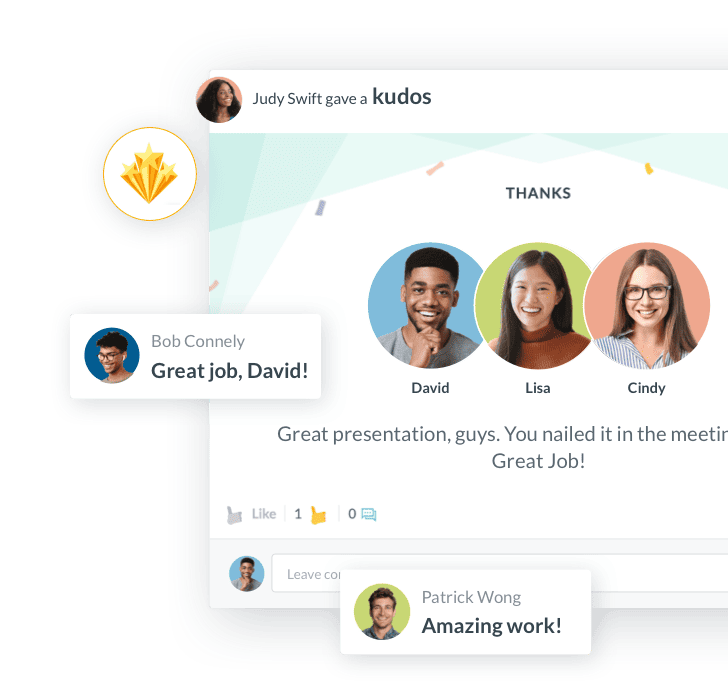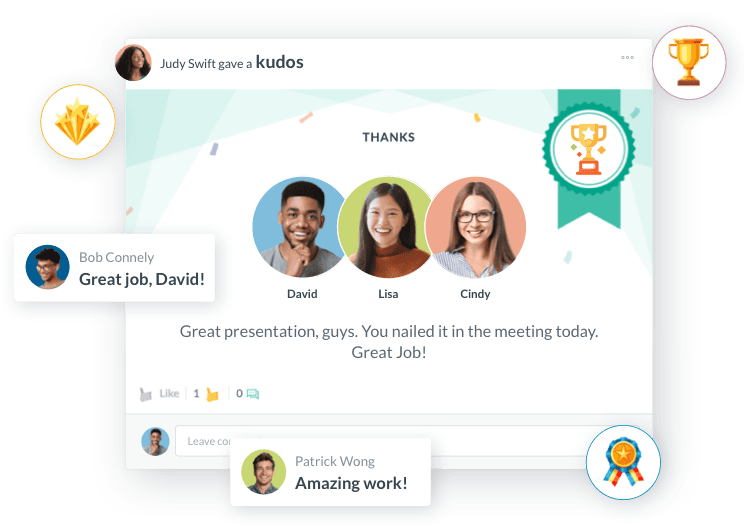

 Cut onboarding time
by 60%—here's the
Ultimate Checklist
that helped do it.
Cut onboarding time
by 60%—here's the
Ultimate Checklist
that helped do it.

An intranet is a secure, private network that connects your employees, centralizes company information, and streamlines internal communication within your organization. Unlike the public internet, an intranet is accessible only to your workforce—creating a digital hub for collaboration, knowledge sharing, and employee engagement.
In 2026, modern intranet platforms have evolved far beyond simple document repositories. Today's intranets are AI-powered, mobile-first communication hubs that drive productivity, foster culture, and support distributed workforces—from corporate offices to frontline workers in healthcare, manufacturing, and retail.
Definition of an Intranet
An intranet is a private network within your organization that enables secure, real-time communication and information sharing exclusively among your employees. Think of it as your company's internal website—a centralized digital workplace where teams access everything they need to do their jobs effectively.
Modern employee intranets serve multiple purposes: they're communication platforms, document management systems, employee directories, and engagement hubs all in one. For organizations managing distributed teams or deskless workers, an intranet becomes the essential connection point that keeps everyone aligned with company goals and culture.
According to recent Gallup research, organizations with highly connected workforces experience 23% higher profitability. A well-implemented intranet directly contributes to this connectivity by ensuring information flows seamlessly across departments, locations, and work arrangements.
History and Evolution of Intranets
The 1990s: Basic Information Pages
When intranets first appeared alongside the internet in the early 1990s, they functioned as simple internal web pages. These rudimentary systems displayed company announcements and policy documents through static HTML pages with limited interactivity. Organizations used them primarily for top-down communication, with IT departments controlling all content updates.
The 2000s: Functional Integration
As technology advanced, intranets incorporated help desk capabilities and basic HR functions. Employee directories, benefits information, and request submission systems became standard features. However, these systems still lacked the two-way communication employees increasingly expected.
The 2010s: Social Transformation
The rise of social media fundamentally changed intranet expectations. Organizations began implementing features like news feeds, comments, mentions, and hashtags. Intranets evolved from static repositories into dynamic internal communication platforms that enabled genuine employee conversations and collaboration.
2020s and Beyond: AI-Powered Digital Workplaces
Today's intranets leverage artificial intelligence, mobile-first design, and sophisticated integration ecosystems. They support hybrid workforces, provide personalized content experiences, and integrate seamlessly with tools like Microsoft Teams, Slack, and enterprise systems such as ADP, Workday, and UKG. Modern platforms like Workmates by HR Cloud exemplify this evolution, offering comprehensive employee engagement alongside core intranet capabilities.
Difference Between Intranet, Internet, and Extranet
Understanding the distinctions between these three networks is crucial for HR professionals evaluating communication technologies:
Internet: A global, public network accessible to anyone with an internet connection. It's not owned or controlled by any single organization. Examples include public websites, search engines, and social media platforms.
Intranet: A private network restricted to employees within a specific organization. Access requires authentication, and content remains confidential. For instance, Google's internal "MOMA" intranet is accessible only to Google employees, protecting sensitive company information and facilitating secure collaboration.
Extranet: An extension of an intranet that grants controlled access to specific external parties—customers, suppliers, or business partners. Walmart's "Retail Link" extranet allows approved suppliers to access inventory data while maintaining security controls over who sees what information.
The key difference lies in access control and intended audience. While the internet serves everyone, intranets serve your organization exclusively, and extranets bridge your organization with selected external stakeholders.
What Are Intranets Used For?
Modern intranets serve four primary functions that can be customized to your organization's specific needs:
1. Communication Hub
Intranets centralize all company communications—from executive updates to department announcements. Features like customizable channels enable targeted messaging, ensuring manufacturing floor workers receive relevant safety updates while marketing teams access campaign briefs. For global organizations, this creates consistency across regions and time zones.
2. Collaboration Platform
Teams use intranets to coordinate projects, share files, and brainstorm ideas in real-time. Modern platforms support document co-editing, project workspaces, and employee recognition features that strengthen workplace relationships. Research from McKinsey shows that organizations embracing digital workplace solutions see 20-25% productivity increases.


3. Information Repository
Intranets serve as your single source of truth for company policies, procedures, training materials, and resources. Content management systems within intranets organize information logically, with powerful search capabilities ensuring employees find what they need instantly rather than wasting time hunting through email threads or shared drives.
4. Employee Engagement Driver
Beyond practical functions, intranets build company culture through social features, wellness initiatives, and recognition programs. Features like polls and surveys provide leadership with real-time insights into employee sentiment, enabling data-driven decisions about workplace improvements.
Industry-Specific Applications
In healthcare, intranets ensure HIPAA-compliant communication of patient care protocols and regulatory updates to nurses and physicians across hospital systems. Manufacturing operations use intranets to deliver safety alerts and equipment updates to production floor workers via mobile devices and digital signage. Retail organizations coordinate shift schedules, inventory updates, and promotional campaigns across hundreds of store locations, while construction companies keep site supervisors and project managers aligned despite distributed job sites.
For frontline workers in healthcare, retail, or manufacturing, mobile-enabled intranets bridge the gap between deskless employees and corporate communications—a critical capability when only 31% of workers have regular desktop access, according to recent industry research.
Essential Intranet Features for 2026
Leading intranet platforms now offer sophisticated capabilities that go far beyond basic communication:
Core Functionality:
-
Document management with version control and collaborative editing
-
Employee directory and org charts with rich profile information
-
Workflows and digital forms for automating approvals and processes
-
Event management and calendar integration
-
Intuitive search with AI-powered relevance ranking
Communication & Engagement:
-
Group channels for department and project-based discussions
-
Social features including commenting, liking, and @mentions
-
Recognition and rewards systems with points and badges
-
Digital signage integration for reaching non-desk workers
-
Real-time notifications via email, SMS, and push alerts
Modern Enhancements:
-
Mobile apps with offline functionality for frontline workers
-
Integration with cloud-based systems (Office 365, Google Workspace, payroll platforms)
-
AI-powered content recommendations and personalization
-
Analytics dashboards tracking engagement and content performance
-
Multi-language support for global organizations
Security & Compliance:
-
Role-based access controls and permissions
-
Single sign-on (SSO) integration
-
SOC 2 and GDPR compliance capabilities
-
Audit trails and activity monitoring
-
Data encryption and secure file sharing
Modern intranet platforms leverage artificial intelligence to enhance user experience through intelligent search that understands natural language queries, personalized content recommendations based on role and interests, and sentiment analysis that alerts leaders to engagement concerns before they escalate. AI-powered notifications ensure employees receive timely, relevant updates without overwhelming them with information they don't need.
Advantages and Disadvantages of Intranets
Advantages: Why Intranets Matter
Enhanced Productivity & Efficiency Employees with easy access to information work faster and make better decisions. According to Gallup's research, highly engaged workforces (often driven by effective intranets) achieve 21% higher profitability. When your team spends less time searching for documents or clarification, they spend more time delivering results.
Intranets also support building virtual culture for remote teams, maintaining alignment with company values and mission even when employees never meet face-to-face. Organizations report that structured onboarding via intranets alone boosts retention by up to 82%.
Centralized, Secure Information All critical business data lives in one protected location with granular access controls. Your HR team can manage sensitive employee information, IT can distribute security policies, and compliance teams can ensure everyone acknowledges required training—all within a secure, auditable environment. This eliminates the security risks of information scattered across personal email accounts or consumer cloud storage.
Improved Employee Experience Modern intranets transform employee onboarding from an overwhelming paper chase into an engaging digital journey. New hires access everything they need through personalized portals, complete tasks at their own pace, and connect with colleagues before their first day. Current employees benefit from streamlined time-off requests, transparent performance feedback, and continuous recognition that keeps them motivated.
Data shows that 69% of employees are more likely to stay when they feel valued and connected—precisely what effective intranet platforms deliver.
Cost Savings & Sustainability Digital communication reduces printing costs, duplicate document storage, and manual process overhead. When HR shifts benefits enrollment from paper forms to an intranet portal, the cost per enrollment can drop by 80% (as PeopleSoft documented when they made this transition). Organizations also reduce their environmental impact through paperless operations.
 — Andrea Bermudez, Organizational & Talent Development Manager
— Andrea Bermudez, Organizational & Talent Development Manager 

Disadvantages: Considerations & Challenges
Implementation & Maintenance: Costs Building and maintaining an effective intranet requires investment. You'll need technical resources to configure the platform, integrate with existing systems, and provide ongoing updates. However, modern cloud-based solutions like HR Cloud's platform significantly reduce these burdens through intuitive interfaces and included support.
Information Overload: Risk Without proper governance, intranets can become cluttered with outdated content and excessive notifications. Success requires clear content strategies, regular audits, and training employees on best practices. Organizations should implement content lifecycle policies that archive outdated information automatically and designate content owners for each section. Research from the BBC highlights how information overload impacts workplace productivity.
Adoption Challenges: Employees may resist new technology, especially if your current intranet has been neglected or previous rollouts failed. Overcoming this requires executive sponsorship, thorough training, and demonstrating immediate value. Starting with high-impact use cases—like streamlining commonly requested HR forms—builds momentum for broader adoption.
Security Vulnerabilities: While intranets are more secure than public sharing methods, they're not immune to threats. Organizations must implement robust security protocols, keep platforms updated, and train employees to recognize social engineering attacks. Choosing platforms with strong security certifications (SOC 2 compliance, encryption standards) and regular third-party audits mitigates these risks significantly.
Why Modern Intranets Are Critical for 2026 Workplaces
Traditional intranets with outdated interfaces and limited functionality are becoming obsolete—and for good reason. Employee expectations have evolved dramatically. Today's workforce, having grown up with intuitive consumer apps, expects the same experience at work.
The Digital Workplace Imperative
Research from Gallup reveals a concerning reality: in 2024, U.S. employee engagement hit an 11-year low, with only 33% of workers engaged. This disengagement costs organizations approximately $1.9 trillion annually in lost productivity. The right intranet technology directly addresses this crisis.
Modern platforms transform how work happens:
-
Real-time collaboration replaces endless email chains
-
Mobile accessibility connects frontline workers previously excluded from corporate communications
-
AI-powered search surfaces relevant information instantly
-
Analytics dashboards provide leadership with actionable engagement insights
Meeting Hybrid & Remote Work Demands
With 62% of U.S. workers now in hybrid or remote arrangements (up from 31% pre-pandemic), intranets serve as the virtual office that keeps distributed teams connected. They provide the "water cooler" moments that build relationships, the transparency that builds trust, and the recognition that drives motivation—regardless of physical location.
Competitive Advantage Through Technology
Organizations hesitating to modernize their intranets face real consequences. Studies from Gartner show 9 in 10 intranets fail before the three-year mark, typically due to poor user experience and inability to demonstrate ROI. Meanwhile, companies embracing modern employee engagement platforms report:
-
36% higher productivity among engaged, culturally-aligned employees
-
23% higher profits compared to organizations with low engagement
-
4x revenue growth for companies with strong culture (versus those with weak culture)
The difference between success and failure often comes down to choosing platforms designed specifically for today's challenges. Solutions like Workmates prioritize mobile-first design for frontline workers, seamless integration with existing HR systems, and social features that drive genuine engagement rather than passive information consumption.
Implementing a modern intranet doesn't require months of IT effort. Cloud-based platforms deploy faster than traditional on-premise solutions, with included training and support. Organizations can start with core communication features and progressively add capabilities like recognition programs, advanced analytics, or digital signage as adoption grows—making the transition manageable even for lean IT teams.
Conclusion
An intranet isn't just a "nice-to-have" technology—it's the foundation of your digital workplace strategy. Whether you call it an employee engagement platform, internal communication hub, or social intranet, the purpose remains consistent: connecting your people, streamlining operations, and building the culture that drives business success.
As workplaces continue evolving with AI advancement, distributed teams, and changing employee expectations, your intranet must evolve too. Organizations that invest in modern, purpose-built platforms position themselves to attract top talent, retain valuable employees, and maintain competitive advantage through superior communication and collaboration.
If your current intranet feels like a digital filing cabinet rather than a vibrant community hub, it's time to explore modern alternatives designed for today's workplace realities.
Ready to see how a modern intranet can transform your employee experience? Explore HR Cloud's Workmates platform and discover how leading organizations are engaging their workforce in 2026.
Frequently Asked Questions
Can an intranet function without the Internet?
Yes, an intranet can operate independently on a local network (LAN) as long as all users and the server are connected to that network. However, cloud-based intranets require internet connectivity to access hosted services, and most modern intranets leverage internet connections for optimal functionality, including mobile access and cloud integrations.
When is an intranet better than the Internet?
Intranets excel for internal organizational needs where security, customization, and relevance matter. They provide controlled access to sensitive information, eliminate external distractions, offer tools tailored to your workflows, and ensure only company-specific content reaches your employees—dramatically increasing productivity compared to unstructured internet browsing.
How can an intranet be customized for different departments?
Modern intranets support extensive customization through role-based permissions, departmental channels, and targeted content delivery. HR can maintain employee handbooks and benefits portals, while sales accesses CRM integrations and pipeline dashboards—all within the same platform but with personalized views for each user's role and needs.
What are the costs associated with implementing an intranet?
Costs vary based on organization size, feature requirements, and deployment model. Cloud-based solutions typically range from $3-$15 per user monthly, while on-premise solutions involve higher upfront costs for servers and implementation. Consider total cost of ownership including software licensing, customization, training, ongoing maintenance, and integration with existing systems. Contact HR Cloud for specific pricing based on your requirements.
How does an intranet improve employee engagement?
Intranets boost engagement through recognition programs that make appreciation visible, communication features that ensure everyone hears important updates, collaboration tools that break down silos, and feedback mechanisms that give employees voice in company decisions. According to research from Workhuman, organizations with effective intranets report that employees who feel recognized are 2.7 times more likely to be highly engaged.
About Author:
Christopher Mansfield is a content writer at Perfect Essay. He creates, edits, and manages the production of digital and print content that is consistent with the organization’s brand, style, and tone. Christopher works closely with the internal marketing team to ensure timely delivery of content via various marketing channels and mediums. He also develops and maintains an editorial calendar. He contributes to the webinar program to further thought leadership campaigns for different market segments.
Keep Reading
Best Onboarding Practices for Manufacturing Companies: 15 Proven Tactics That Boost Retention
"Three simple changes to our onboarding process cut our 30-day turnover from 28% to 12%.
Equity in the Workplace: A Practical Guide to Building Fairness and Opportunity
Workplace equity shouldn't be an aspiration—it should be the foundation of how
7 Employee Relations Responsibilities That Transform Workplace Culture
Employee relations shapes how people experience work every single day. It's not just
Like What You Hear?
We'd love to chat with you more about how HR Cloud® can support your business's HR needs. Book Your Free Demo

Build a Culture of Recognition. Boost Engagement. Guaranteed.
Workmates empowers employees to stay informed, connected, and appreciated—whether they’re on the front line, in the office, or remote. Recognition drives 12x higher engagement.Trusted by industry leaders in every sector




Cut Onboarding Costs by 60%.
Take the confusion and follow-ups out of onboarding with automated workflows, digital forms, and structured portals—so new hires ramp faster 3X quicker.Trusted by industry leaders in every sector





